A Garden In the Desert: Bob Bowman Has Led a Dynamic Surge At Arizona State
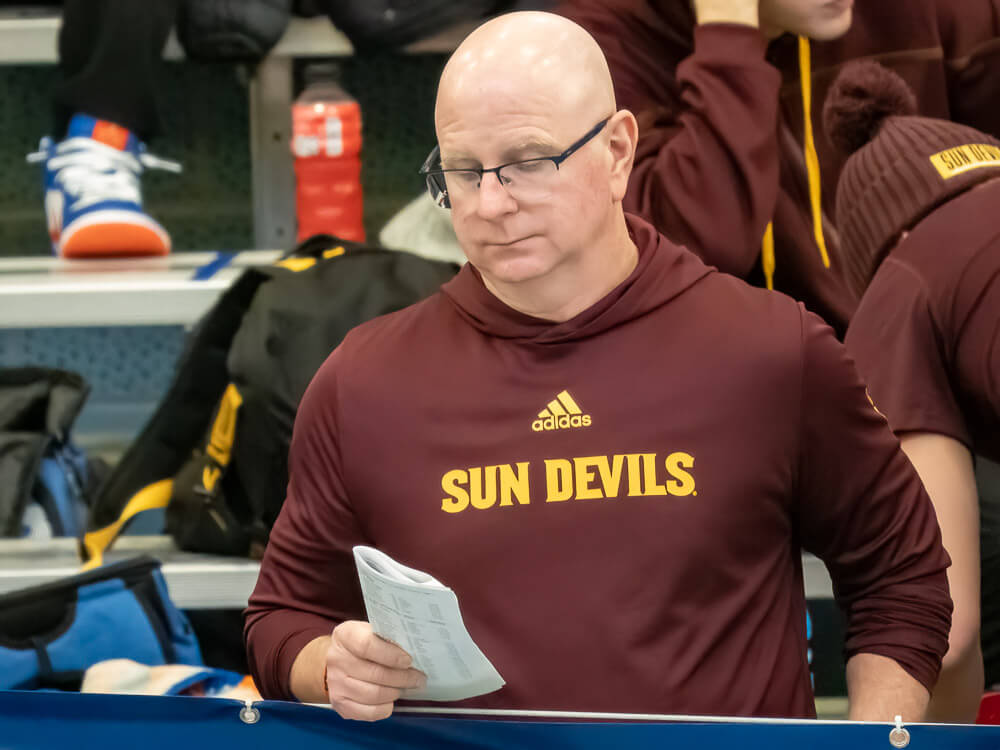
A Garden In the Desert: How Bob Bowman Has Led a Dynamic Surge At Arizona State
When Bob Bowman took over the head-coaching duties at Arizona State University in 2015, the task facing him was daunting—to say the least. He was charged with growing a program from basically nothing into something respectable…and then into something special. And now, eight years later, the longtime coach can claim success, as he has proven that a garden—collegiate and professional—can sprout with the right combination of belief, attention, direction and patience.
There’s a prevailing notion that the desert is not a fertile landscape. Too hot. Too dry. Barren. Just not the most conducive place to plant and grow. Ah, but isn’t it important not to be drawn in by these predispositions? Isn’t it important to believe that the so-called impossible is doable, provided a little foresight is adopted?
The day he accepted the head-coaching role at Arizona State University, Bob Bowman had nothing to prove in the sport. He already boasted Hall of Fame credentials, having guided several athletes to Olympic and international success. He had led the University of Michigan to Big Ten Conference titles. And, of course, he took the chisel to the greatest sculpture this sport has ever seen: Michael Phelps.
So, why did Bowman—in the spring of 2015—opt for a cross-country move from Baltimore to Tempe? Why would he take the reins of a college program that was a doormat…and less than a decade earlier was temporarily axed? Why would he start anew at a locale lacking tradition, when tradition oozed from the doors at the North Baltimore Aquatic Club?
Sometimes, the answer is simple.
“I needed a challenge,” Bowman said.
GENERATING A TURNAROUND
When Bowman first stepped foot on the Arizona State University campus, there were no visions of instantaneous climbs up the Pac-12 Conference ladder. This program was in the doldrums, and only time and dedication would elevate its status. Consequently, Bowman went to work, seeking out small victories. Help athletes cut time. Enhance the number of swimmers in consolation finals at the conference championships. Get a few guys into championship finals.
Given the hand he was dealt, Bowman had no other option. In 2008, before alumni stepped forward to save it, the ASU program was earmarked for extinction. And once it was rescued, convincing quality athletes to represent the school was a difficult chore. After all, what top-tier swimmer would want to compete for a school that had not demonstrated support?
“Boy, has it been a challenge,” Bowman said in a recent interview. “It’s been a process, taking a step-by-step approach. There have been mistakes along the way, but we’ve learned from them, and things have come together. It’s been a result of the athletes, coaches, alumni and parents.”
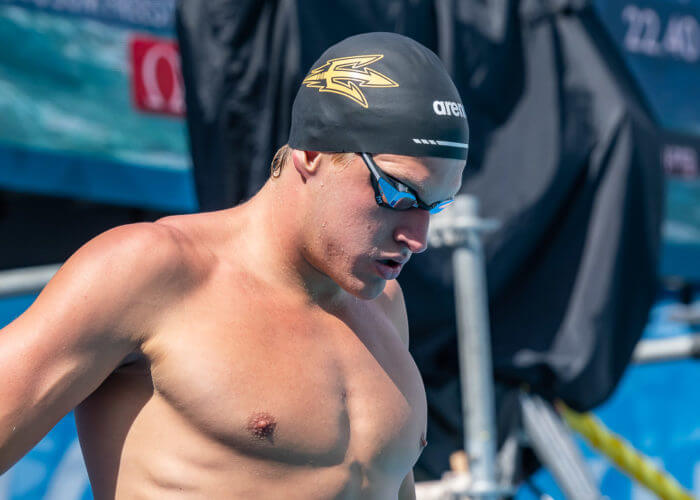
Photo Courtesy: Peter H. Bick
Under Bowman’s watch, growth at ASU was incremental at first. But a turning point came in 2017 when Grant House was lured to become a Sun Devil. As a standout in Ohio for St. Xavier, a tradition-rich swimming powerhouse, House brought legitimacy to the Arizona State program. He was an elite recruit who could have gone anywhere and made a mark. Instead, he chose Tempe and embraced the building process.
Eventually, other top recruits followed, and the program rose up the ranks, making the jump from oblivion to NCAA factor. A sixth-place finish at the 2022 NCAA Men’s Championships served as proof, and 2023 was cause for grand celebration, as the Sun Devils followed a Pac-12 Conference team title with a runner-up showing to Cal at the NCAA Championships.
“He’s meant a lot to what we have achieved,” Bowman said of House. “He was the first person to come here who was recruited by a Texas and other top schools. He got here and knew how to recruit others, push his teammates and showed how to act at practice. He’s a building block of our culture. He had expectations and knew we could do something special.”
A FRENCH CONNECTION
While House was an initial spark to Arizona State’s surge, Frenchman Leon Marchand has been a bonfire to the school’s emergence as a national power. The son of Olympian parents, Marchand committed to the Sun Devils as a world champion at the junior level, a youngster with considerable upside. Under Bowman, who benefits from the support of assistant coaches Herbie Behm and Rachel Stratton-Mills, Marchand has bloomed into—perhaps—the premier force in the sport.
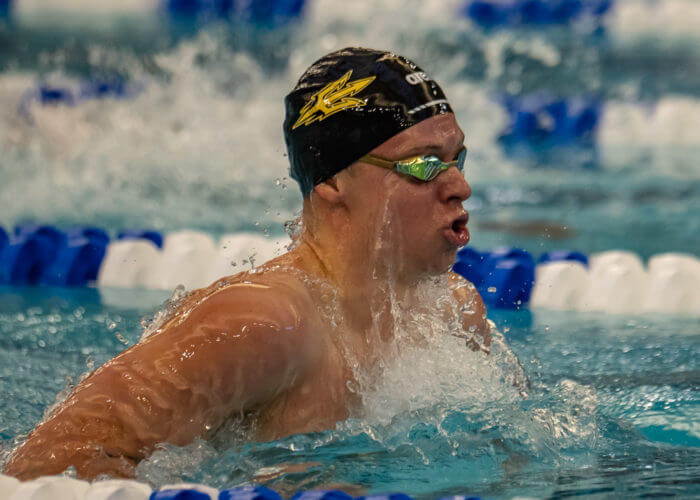
Photo Courtesy: Peter H. Bick
A five-time individual NCAA champion through two years with ASU, Marchand spent his sophomore campaign shredding the collegiate record book. At the NCAA Championships, he claimed victories in the 200 individual medley, 400 individual medley and 200 breaststroke—all three events captured in NCAA-record time. Meanwhile, he was a key cog on a quartet of relays, and could have factored in several other events, if not for limitations placed on the number of entries allowed per athlete.
Beyond the NCAA scene, Marchand ranks alongside Romanian David Popovici and Hungarian Kristof Milak as the current faces of the sport on the global stage. As the reigning world champion in both individual medley events, Marchand will try to defend those titles this summer in Fukuoka, while also contesting the 200 butterfly, where he is the reigning silver medalist from the World Champs. And then there’s next year, and the chance to compete at a home Olympics, with the Games slated for Paris.
Obviously, Marchand’s presence is attractive for potential recruits, and the 21-year-old has thoroughly enjoyed helping the ASU program develop into its current state.
“I think what’s crazy about ASU is that we’re building everything,” Marchand said. “There was no tradition. There was no culture in the past. Guys came in and have been building it, and we continue to improve it every year. The team spirit is great now, and I think it’s going to be better every year.”
THE PROFESSIONAL POOL
Because Bowman was hired by Arizona State a little more than a year out from the 2016 Olympic Games in Rio de Janeiro, several of his professional swimmers at the time followed him from NBAC. With Phelps and Allison Schmitt headlining the pro group, it clearly had swagger. Still, what he is working with today—on an overall basis—is far beyond.
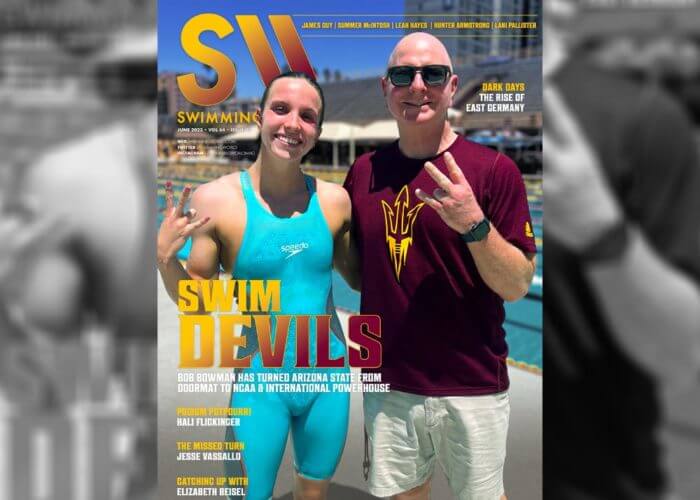 The lanes at the Mona Plummer Aquatic Center during practice are stacked with talent, ranging from Olympic champions and medalists to titlists and podium finishers from the World Championships. There is a lot to balance, especially with a World Champs this summer and an Olympics on the horizon, but the environment makes for something unique.
The lanes at the Mona Plummer Aquatic Center during practice are stacked with talent, ranging from Olympic champions and medalists to titlists and podium finishers from the World Championships. There is a lot to balance, especially with a World Champs this summer and an Olympics on the horizon, but the environment makes for something unique.
The setup Bowman oversees is not unfamiliar. When he was the head coach at Michigan, his Club Wolverine was loaded with some of the biggest names in the sport: Phelps, Schmitt, Peter Vanderkaay and Kaitlin Sandeno, among others. More, he operated at NBAC with the likes of France’s Yannick Agnel and American Conor Dwyer. Surely, Bowman knows how to balance the varied needs of his athletes, both physically and mentally.
In the current setup, Bowman has his college swimmers training alongside his professional crew. The approach allows these talented individuals to feed off each other, and allows Bowman the necessary time for himself…or to see his grandchildren.
“It does remind me of Ann Arbor, where we had talented people who were world-class and were doing things that pushed the limits,” Bowman said. “We’re getting people to think bigger and buy into what we’re doing. I’m better at dealing with individual needs and doing things within a bigger group that work for the specific athlete.”
Between this summer and next, Bowman could place numerous athletes on various national teams, including Team USA. Consider the roster he is guiding:
- Chase Kalisz
- Regan Smith
- Hali Flickinger
- Leon Marchand
- Olivia Smoliga
- Simone Manuel
- Jay Litherland
- Ryan Held
- Grant House
- Hubert Kos
- Sierra Schmidt
- Chloe Isleta
- Xander Skinner
- Jarod Arroyo
Once an age-group pupil at NBAC, Chase Kalisz returned to Bowman after University of Georgia coach, Jack Bauerle, retired last year. The pair has again clicked, with a deeper understanding of what Kalisz can handle. Although Kalisz has indicated he has logged more training yardage with Bowman than prior, Bowman also gave his protégé three days off earlier this year after the TYR Pro Series stop in Knoxville. Simply, Bowman knew the body of a 30-year-old Kalisz needed a break.
In terms of the dynamic of the group, Bowman is thrilled with the meshing of personalities. He indicated that Kalisz is the group’s vocal leader, a guy who genuinely cares about his teammates. When needed, Kalisz is the team member who will bring levity to practice, sometimes through the needling of the head coach.
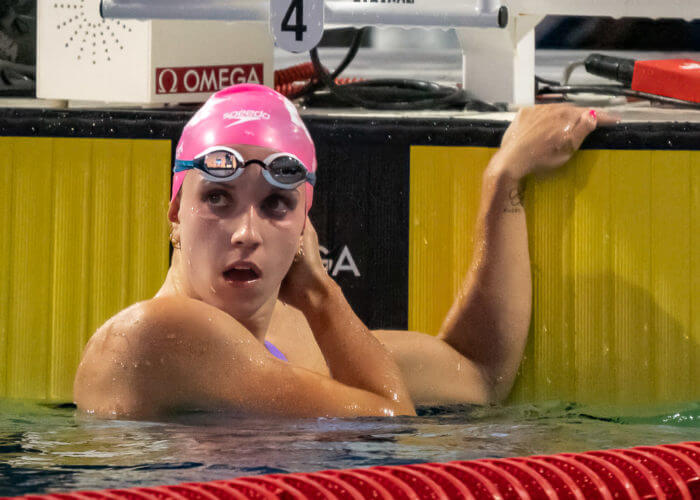
Photo Courtesy: Peter H. Bick
Meanwhile, Bowman raved about the work ethic of Regan Smith, who turned professional after her freshman year at Stanford and relocated from Northern California to Tempe. During practice, Smith rarely says a word, according to Bowman, but sets a tremendous example through her actions.
Since joining Bowman, Smith has been brilliant during midseason competitions, flourishing in backstroke and butterfly. The multi-time Olympian appears poised for a big summer and has enjoyed her move to Arizona.
“I’ve enjoyed everything about my new environment,” Smith said. “I love having the opportunity to have my own apartment and have privacy. I love how elite the training group is with Bob because I am pushed so hard every day, and it has made me a lot better. I respect Bob’s coaching style a lot because he doesn’t cut corners and has a plan for every day. This is the first time in quite a while that I’ve truly felt like an elite athlete who is training toward something with a purpose.”
LOOKING AHEAD
No one can foreshadow what the future holds. Yet, we have an idea when it comes to what Bob Bowman is managing in the desert. For one, the Arizona State University men’s program is positioned to impact the team-title picture at the NCAA Championships for years to come. Meanwhile, what unfolds in international waters—Olympic Games and World Champs—will undoubtedly be influenced by the athletes working under Bowman.
“I think everyone knows the time-crunch we’re working under,” Bowman said of the 2024 Olympics in Paris. “There’s never enough time, and they feel a sense of urgency. But we encourage them to focus on what we need to do in practice and put money in the bank.”
Perhaps to some, the desert isn’t viewed as a viable place to grow something special. Bowman never adhered to that thought process, and now—eight years into his tenure out West—he’s proven himself to be one hell of a gardener.




Excellent article and description of what makes the ASU program under Bob Bowman so special!